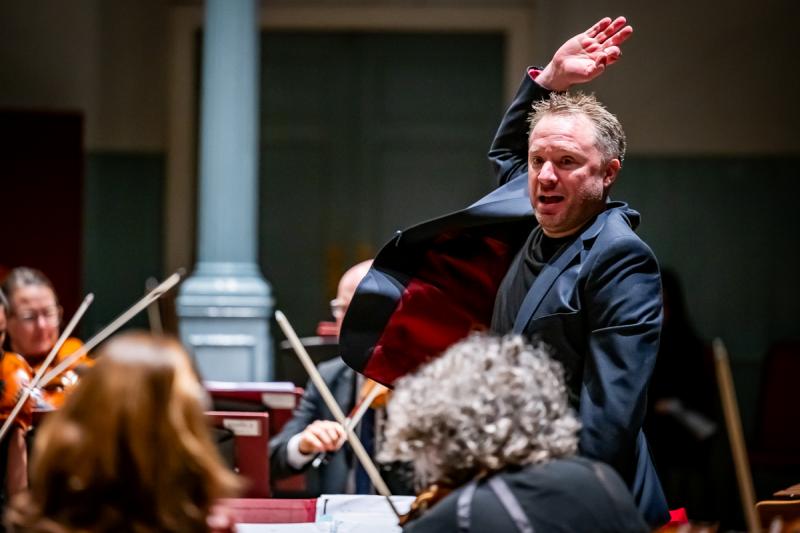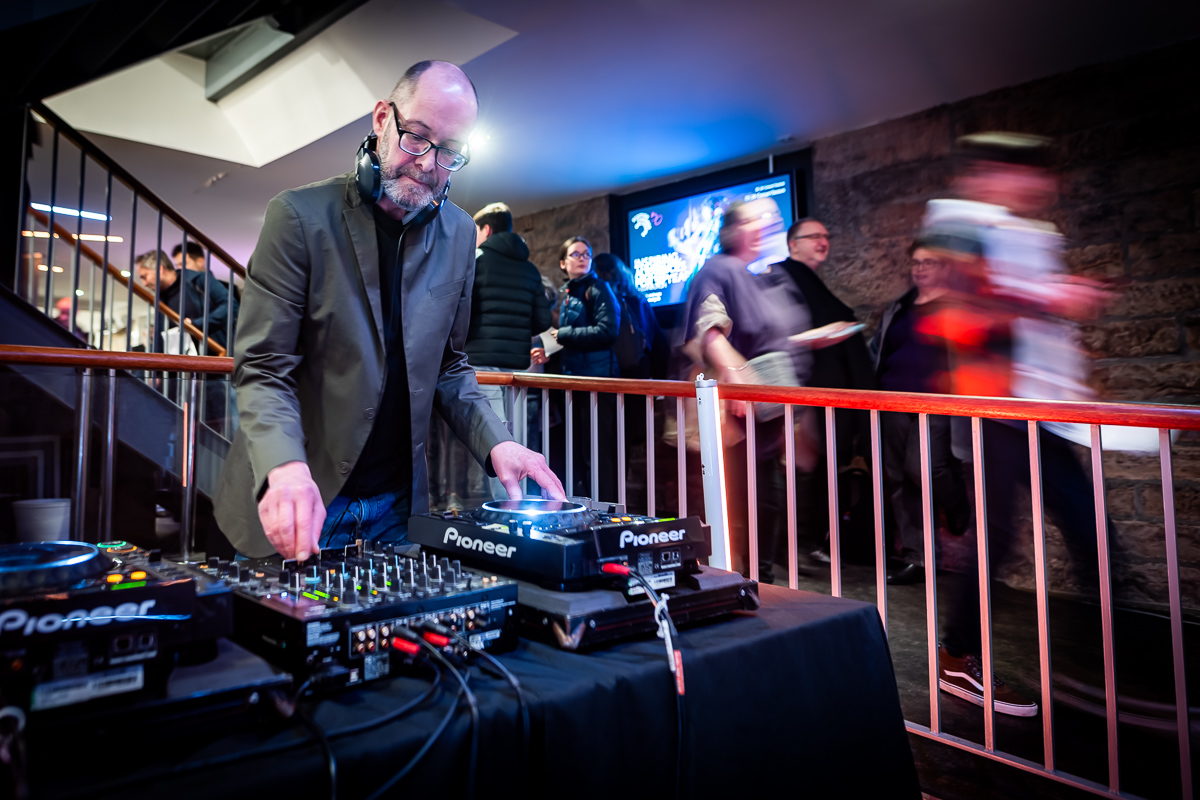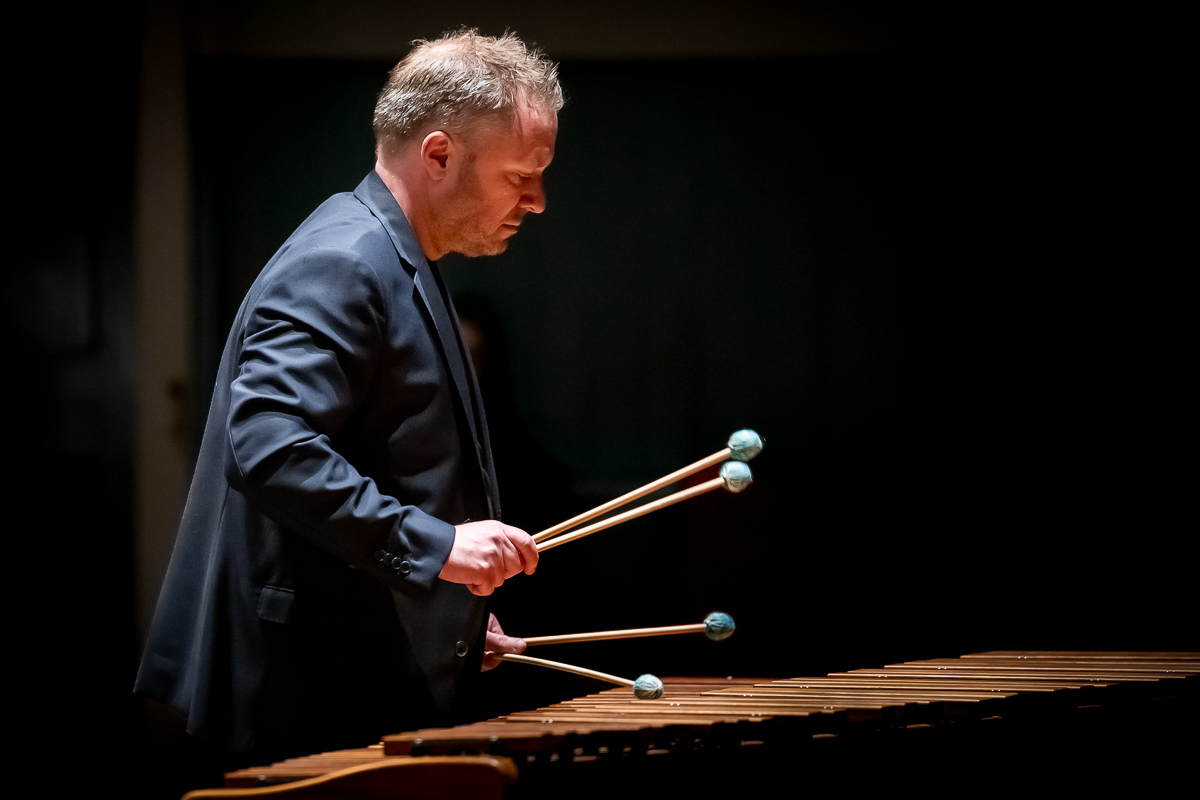Scottish Chamber Orchestra, Currie, Queen’s Hall, Edinburgh review - maximum minimalism | reviews, news & interviews
Scottish Chamber Orchestra, Currie, Queen’s Hall, Edinburgh review - maximum minimalism
Scottish Chamber Orchestra, Currie, Queen’s Hall, Edinburgh review - maximum minimalism
A singular pick of modern classics

Chameleon among orchestras, the Scottish Chamber Orchestra hung up its habitual classical cloak in favour of an evening of 20th and 21st century minimalism, curated, presented, and conducted by the star percussionist Colin Currie.
That this was a different sort of concert was obvious from the outset; before the concert, DJ Dolphin Boy was installed in the Queen's Hall foyer (pictured below), filling the surrounding spaces with rich ambient noise. On a freezing cold Edinburgh night the long bar was a haven of warmth, jostling with heavy coats, pints and cocktails. More of a party than a concert.  In the hall itself, the stage was conventionally set out for chamber orchestra, with some extra percussion out front and a couple of pianos lurking in the wings. First up was a piece from the grand old man of minimalism, the Estonian composer Arvo Pärt. Fratres was composed in 1977 at a time when Estonia was still in the USSR and a composer could still raise the eyebrows of officialdom by writing a 15 minute piece that goes nowhere very slowly, albeit with exquisite, mesmerising beauty. The piece exists in numerous instrumentations, on this occasion performed by horns and woodwind quintet including the contrabass clarinet. It has the feel of a procession, with an endlessly repeated and subtly transformed melodic fragment punctuated by occasional interjections from woodblocks and timpani, played at the podium by the conductor. Such is the slowness and apparent inevitability of the transformations, it feels as if Fratres could go on for ever, and it comes as a bit of a shock when the procession finally comes to a halt.
In the hall itself, the stage was conventionally set out for chamber orchestra, with some extra percussion out front and a couple of pianos lurking in the wings. First up was a piece from the grand old man of minimalism, the Estonian composer Arvo Pärt. Fratres was composed in 1977 at a time when Estonia was still in the USSR and a composer could still raise the eyebrows of officialdom by writing a 15 minute piece that goes nowhere very slowly, albeit with exquisite, mesmerising beauty. The piece exists in numerous instrumentations, on this occasion performed by horns and woodwind quintet including the contrabass clarinet. It has the feel of a procession, with an endlessly repeated and subtly transformed melodic fragment punctuated by occasional interjections from woodblocks and timpani, played at the podium by the conductor. Such is the slowness and apparent inevitability of the transformations, it feels as if Fratres could go on for ever, and it comes as a bit of a shock when the procession finally comes to a halt.
A complete change of mood followed in the form of Louis Andriessen’s Tapdance, described as a percussion concerto but to my ears more of an orchestral rhapsody with a series of linear interjections from percussion. This piece, here receiving its Scottish premiere, is clearly inspired by the rhythms and melodies of jazz, particularly Horace Silver’s Señor Blues, quoted at the outset, but as the piece progresses it seems as though the familiar expressions of jazz are uprooted and compressed into fiercely dissonant fragments with faintly menacing harmonies that defy any resolution. As soloist, Currie starts out by propelling the music forward with tabletop tap rhythms, then taking centre stage for a meandering, pensive solo for marimba, and finally bringing the piece to a close with variably tuned beats on a single timpani.  If there was a subliminal sense of menace in Tapdance, it was quite explicit in the next piece, Julia Wolfe’s Fuel, also receiving its Scottish premiere. This was conceived in collaboration with the film maker Bill Morrison, as a powerful examination of the fossil fuel economy, in its pivotal role both as the engine of our economic survival and equally as the agent of our self-destruction. Wolfe’s score, for string ensemble, hits hard from the outset, with a visceral repetitive screech from the upper strings over a churning accompaniment that only occasionally lets in the light of melody or harmony. It divides into five movements, fast and slow alternating, but in performance the slow sections are but a brief pause for refuelling, so to speak, before the assault begins anew. It comes to a blockbuster conclusion, with an angry dissonance that builds in volume and comes to a sudden halt without ever reaching the implied resolution. It occurred to me that if you wanted to discourage people from flying, you need only play this most unsettling of scores in the airport concourse.
If there was a subliminal sense of menace in Tapdance, it was quite explicit in the next piece, Julia Wolfe’s Fuel, also receiving its Scottish premiere. This was conceived in collaboration with the film maker Bill Morrison, as a powerful examination of the fossil fuel economy, in its pivotal role both as the engine of our economic survival and equally as the agent of our self-destruction. Wolfe’s score, for string ensemble, hits hard from the outset, with a visceral repetitive screech from the upper strings over a churning accompaniment that only occasionally lets in the light of melody or harmony. It divides into five movements, fast and slow alternating, but in performance the slow sections are but a brief pause for refuelling, so to speak, before the assault begins anew. It comes to a blockbuster conclusion, with an angry dissonance that builds in volume and comes to a sudden halt without ever reaching the implied resolution. It occurred to me that if you wanted to discourage people from flying, you need only play this most unsettling of scores in the airport concourse.
Life was a bit easier on the ear after the interval, with two pieces by Steve Reich. The first, Pulse, dates from 2015 and does exactly what it says on the tin: a single piano provides an absolutely steady pulse over which a string sextet and four woodwind weave a minutely varying tapestry of repetitive melody. If this was the pretty side of minimalism, soothing and satisfying, then the final work of the evening, Radio Rewrite, added extra layers of melodic and percussive interest. Two pianos, side by side, two symmetrical glockenspiels, and an electric bass delivered volume, texture, and a certain richness of timbre, with surface interest from a string quartet and woodwind. Cast in five movements, this piece takes as its starting point two songs by the band Radiohead, whose guitarist Jonny Greenwood became friends with Reich when they met at a festival in Poland in 2010. The pop songs can be heard intermittently in the five movements, again arranged fast and slow alternating, the faster sections gradually becoming more and more fragmented and angular. This made a high spirited and affirmative end to an evening received with rapturous applause by a sellout audience.
rating
Explore topics
Share this article
The future of Arts Journalism
You can stop theartsdesk.com closing!
We urgently need financing to survive. Our fundraising drive has thus far raised £49,000 but we need to reach £100,000 or we will be forced to close. Please contribute here: https://gofund.me/c3f6033d
And if you can forward this information to anyone who might assist, we’d be grateful.

Subscribe to theartsdesk.com
Thank you for continuing to read our work on theartsdesk.com. For unlimited access to every article in its entirety, including our archive of more than 15,000 pieces, we're asking for £5 per month or £40 per year. We feel it's a very good deal, and hope you do too.
To take a subscription now simply click here.
And if you're looking for that extra gift for a friend or family member, why not treat them to a theartsdesk.com gift subscription?
more Classical music
 Hallé John Adams festival, Bridgewater Hall / RNCM, Manchester review - standing ovations for today's music
From 1980 to 2025 with the West Coast’s pied piper and his eager following
Hallé John Adams festival, Bridgewater Hall / RNCM, Manchester review - standing ovations for today's music
From 1980 to 2025 with the West Coast’s pied piper and his eager following
 Kaploukhii, Greenwich Chamber Orchestra, Cutts, St James's Piccadilly review - promising young pianist
A robust and assertive Beethoven concerto suggests a player to follow
Kaploukhii, Greenwich Chamber Orchestra, Cutts, St James's Piccadilly review - promising young pianist
A robust and assertive Beethoven concerto suggests a player to follow
 Robin Holloway: Music's Odyssey review - lessons in composition
Broad and idiosyncratic survey of classical music is insightful but slightly indigestible
Robin Holloway: Music's Odyssey review - lessons in composition
Broad and idiosyncratic survey of classical music is insightful but slightly indigestible
 Classical CDs: Wolf-pelts, clowns and social realism
British ballet scores, 19th century cello works and contemporary piano etudes
Classical CDs: Wolf-pelts, clowns and social realism
British ballet scores, 19th century cello works and contemporary piano etudes
 Bizet in 150th anniversary year: rich and rare French offerings from Palazzetto Bru Zane
Specialists in French romantic music unveil a treasure trove both live and on disc
Bizet in 150th anniversary year: rich and rare French offerings from Palazzetto Bru Zane
Specialists in French romantic music unveil a treasure trove both live and on disc
 Scottish Chamber Orchestra, Ibragimova, Queen’s Hall, Edinburgh review - rarities, novelties and drumrolls
A pity the SCO didn't pick a better showcase for a shining guest artist
Scottish Chamber Orchestra, Ibragimova, Queen’s Hall, Edinburgh review - rarities, novelties and drumrolls
A pity the SCO didn't pick a better showcase for a shining guest artist
 Kilsby, Parkes, Sinfonia of London, Wilson, Barbican review - string things zing and sing in expert hands
British masterpieces for strings plus other-worldly tenor and horn - and a muscular rarity
Kilsby, Parkes, Sinfonia of London, Wilson, Barbican review - string things zing and sing in expert hands
British masterpieces for strings plus other-worldly tenor and horn - and a muscular rarity
 From Historical to Hip-Hop, Classically Black Music Festival, Kings Place review - a cluster of impressive stars for the future
From quasi-Mozartian elegance to the gritty humour of a kitchen inspection
From Historical to Hip-Hop, Classically Black Music Festival, Kings Place review - a cluster of impressive stars for the future
From quasi-Mozartian elegance to the gritty humour of a kitchen inspection
 Shibe, LSO, Adès, Barbican review - gaudy and glorious new music alongside serene Sibelius
Adès’s passion makes persuasive case for the music he loves, both new and old
Shibe, LSO, Adès, Barbican review - gaudy and glorious new music alongside serene Sibelius
Adès’s passion makes persuasive case for the music he loves, both new and old
 Anja Mittermüller, Richard Fu, Wigmore Hall review - a glorious hall debut
The Austrian mezzo shines - at the age of 22
Anja Mittermüller, Richard Fu, Wigmore Hall review - a glorious hall debut
The Austrian mezzo shines - at the age of 22
 First Person: clarinettist Oliver Pashley on the new horizons of The Hermes Experiment's latest album
Compositions by members of this unusual quartet feature for the first time
First Person: clarinettist Oliver Pashley on the new horizons of The Hermes Experiment's latest album
Compositions by members of this unusual quartet feature for the first time

Add comment